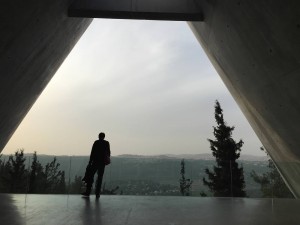In one of the more emotional and difficult tours on the trip, we visited Yad Vashem, the Israeli Holocaust Museum and home to the International Institute of Holocaust Research. The museum itself houses hours of historical footage, video interviews, and artifacts, including the famous Hall of Names, a memorial dedicated to remembering each and every person killed in the Holocaust. Many students recounted this visit as their most touching memory.
Student Andrea Lau recalls what Yad Vashem represents and how the experience affected her:
“ה וְנָתַתִּי לָהֶם בְּבֵיתִי וּבְחוֹמֹתַי, יָד וָשֵׁם–טוֹב, מִבָּנִים וּמִבָּנוֹת: שֵׁם עוֹלָם אֶתֶּן-לוֹ, אֲשֶׁר לֹא יִכָּרֵת.”
Even unto them will I give in my house and within my walls a place and a name better than of sons and of daughters: I will give them an everlasting name, that shall not be cut off.- Isaiah 56:5
The literal meaning of Yad Vashem is derived from Isaiah 56:5. God promised His people a place and a name that will last for all eternity. Even though millions of Jews lost the ir lives in the Holocaust, they will never lose their names or their place of remembrance. Yad Vashem is Israel’s national Holocaust museum and memorial, constructed to commemorate the millions of Jews that lost their lives in the Holocaust.
ir lives in the Holocaust, they will never lose their names or their place of remembrance. Yad Vashem is Israel’s national Holocaust museum and memorial, constructed to commemorate the millions of Jews that lost their lives in the Holocaust.
 Our April guest blogger with be 3L Elizabeth Oestreich. Elizabeth is from Fond du Lac and is interested in labor and employment law, family law, and general civil litigation, although she has heard that law school interests do not necessarily determine career paths. Many thanks to our previous guest, 1L Jessica Lothman.
Our April guest blogger with be 3L Elizabeth Oestreich. Elizabeth is from Fond du Lac and is interested in labor and employment law, family law, and general civil litigation, although she has heard that law school interests do not necessarily determine career paths. Many thanks to our previous guest, 1L Jessica Lothman.
 ir lives in the Holocaust, they will never lose their names or their place of remembrance. Yad Vashem is Israel’s national Holocaust museum and memorial, constructed to commemorate the millions of Jews that lost their lives in the Holocaust.
ir lives in the Holocaust, they will never lose their names or their place of remembrance. Yad Vashem is Israel’s national Holocaust museum and memorial, constructed to commemorate the millions of Jews that lost their lives in the Holocaust.